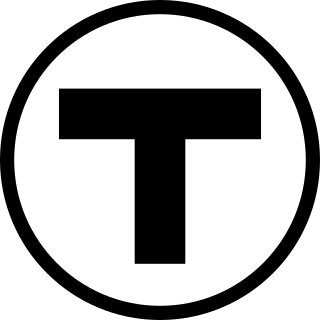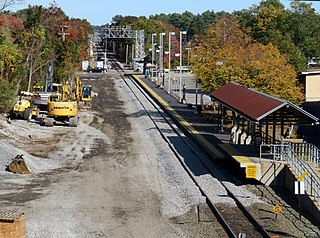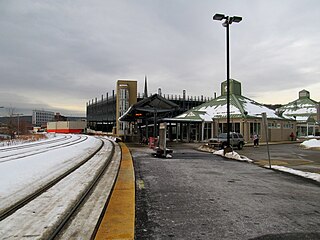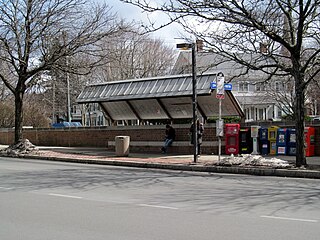
The MBTA Commuter Rail system serves as the commuter rail arm of the Massachusetts Bay Transportation Authority's (MBTA's) transportation coverage of Greater Boston in the United States. Trains run over 394 mi (634 km) of track to 134 stations. It is operated under contract by Keolis, which took over operations on July 1, 2014, from the Massachusetts Bay Commuter Railroad Company (MBCR).

The Boston and Albany Railroad was a railroad connecting Boston, Massachusetts to Albany, New York, later becoming part of the New York Central Railroad system, Conrail, and CSX Transportation. The line is currently used by CSX for freight. Passenger service is provided on the line by Amtrak, as part of their Lake Shore Limited service, and by the MBTA Commuter Rail system, which owns the section east of Worcester and operates it as its Framingham/Worcester Line.

The Framingham/Worcester Line of the MBTA Commuter Rail system runs west from Boston, Massachusetts to Worcester, Massachusetts through the MetroWest region, serving 17 station stops in Boston, Newton, Wellesley, Natick, Framingham, Ashland, Southborough, Westborough, Grafton, and Worcester. It is the third longest and third busiest line in the MBTA Commuter Rail system. Service on the line is a mix of local and express trains serving Worcester plus short-turn Framingham locals.

Natick Center station is an MBTA Commuter Rail station in Natick, Massachusetts served by the Framingham/Worcester Line. The station, located below grade in a wide cut adjacent to North Main Street, has two side platforms serving the line's two tracks. The second-busiest non-accessible station on the system, it is undergoing a major accessibility renovation and modernization from 2020 to 2024.

Lansdowne station is an MBTA Commuter Rail station in Boston, Massachusetts. It serves the Framingham/Worcester Line. Lansdowne is located next to the Massachusetts Turnpike in the Fenway–Kenmore neighborhood near Kenmore Square, below grade between Beacon Street and Brookline Avenue.

West Concord station is an MBTA Commuter Rail station located in West Concord, Massachusetts. It is served by the Fitchburg Line. The station has two side platforms serving the line's two tracks, with mini-high platforms for accessibility. The adjacent station building, now a restaurant, is not used for railroad purposes.

Ayer station is an MBTA Commuter Rail station located off Main Street in the Ayer Main Street Historic District of Ayer, Massachusetts. It serves the Fitchburg Line. There are three tracks through the station, two of which are served by a pair of low-level side platforms, which are not accessible. There is a shelter on the inbound platform.

The history of the Massachusetts Bay Transportation Authority (MBTA) and its predecessors spans two centuries, starting with one of the oldest railroads in the United States. Development of mass transportation both followed existing economic and population patterns, and helped shape those patterns.

Norfolk station is an MBTA Commuter Rail station in Norfolk, Massachusetts, served by the Franklin/Foxboro Line. The station has one platform which serves a single track, with a mini-high section for accessibility. The Norfolk County Railroad opened through the North Wrentham village of Wrentham in 1849. A branch line to Medway was open from 1852 to 1864. The station was renamed Norfolk along with the town in 1870. Several different railroads operated the line, with the New York, New Haven and Hartford Railroad running it for much of the 20th century. Massachusetts Bay Transportation Authority (MBTA) subsidies began in 1966, and the agency bought the line in 1973. The mini-high platform was added in 1990.

Wellesley Square station is a commuter rail station on the MBTA Commuter Rail Framingham/Worcester Line, located just north of the MA 16-MA 135 intersection in downtown Wellesley, Massachusetts. It serves both walk-up and park-and-ride commuters, with a 224-space parking lot for the latter group. The station has low-level platforms and is not accessible.

West Natick station is a commuter rail station on the MBTA Commuter Rail Framingham/Worcester Line, located off West Central Street (MA-135) in Natick, Massachusetts. It was opened in 1982 as a park and ride station.

Ashland station is an MBTA Commuter Rail station in Ashland, Massachusetts. It serves the Framingham/Worcester Line. It has a long driveway leading from the south parking lot to the intersection of West Union Street and Voyagers Lane. Like the other stations on the line west of Framingham, Ashland serves as a park-and-ride station with 678 parking spots.

Southborough station is a commuter rail station on the MBTA Commuter Rail Framingham/Worcester Line, located near the intersection of Cordaville Street and River Street in the Cordaville section of Southborough, Massachusetts. The parking area is located off River Street adjacent to the inbound platform. Passengers use ramps and stairways to access the sidewalk along River Street to cross under the tracks.

Westborough station is an MBTA Commuter Rail station in Westborough, Massachusetts. It serves the Framingham/Worcester Line. It is located off Smith Parkway, west of the Westborough town center. The station consists of two side platforms serving the line's two tracks. Each side has a small mini-high platform for accessibility; an overhead ramp structure connects the two platforms.

North Leominster station is an MBTA Commuter Rail station in Leominster, Massachusetts. It serves the Fitchburg Line. It is located at 34 Nashua Street, east of Main Street. The station, which is accessible, has two side platforms to serve the line's two tracks. There is a small freight yard adjacent to the parking lot and mainline tracks on the south end of the inbound platform. A garage opened in 2014 to nearly triple parking capacity at the station, which serves as a park-and-ride stop for Route 2 and I-190, to a total of 436 spaces.

The Fitchburg Intermodal Transportation Center is a regional rail and bus station located in downtown Fitchburg, Massachusetts. It is a stop on the MBTA Commuter Rail Fitchburg Line and a hub for Montachusett Regional Transit Authority local and intercity bus routes.

Framingham station is a historic Boston and Albany Railroad station located in downtown Framingham, Massachusetts. Designed by noted American architect H. H. Richardson, it was one of the last of the railroad stations he designed in the northeastern United States to be built. The station, built in 1884–85, served as a major stop on the B&A Main Line as well as a hub for branch lines to Milford, Mansfield, Fitchburg, and Lowell. After years of deterioration, the station was listed on the National Register of Historic Places in 1975 as the Framingham Railroad Station, and restored a decade later.

Union Station is a railway station located at Washington Square in downtown Worcester, Massachusetts. It is the western terminus of the MBTA Commuter Rail Framingham/Worcester Line and a stop for the Amtrak Lake Shore Limited service. A bus terminal adjacent to the station is the hub for Worcester Regional Transit Authority (WRTA) local bus service; it is also used by PVTA, MART, Peter Pan, and Greyhound intercity buses.

Gardner station is a former station stop on the MBTA Commuter Rail Fitchburg Line, located in Gardner, Massachusetts. Passenger service to Union Station ran from 1851 until 1960, and commuter service also briefly ran from 1980 to 1986. Restoration of passenger service was considered in the early 2000s, but was rejected due to low cost-effectiveness.

Newton Corner is an MBTA bus transfer point in the Newton Corner neighborhood of Newton, Massachusetts, located on the rotary where Washington Street crosses the Massachusetts Turnpike. The Newton Corner station, known simply as Newton for much of its lifetime, served commuters on the Worcester Line from 1834 to 1959. A streetcar stop, located on the surface streets, served a number of routes beginning in 1863, including the Green Line A branch until 1969. Newton Corner is now a stop and transfer point for MBTA routes 52, 57, 501, 504, 553, 554, 556, and 558, which include express routes to downtown Boston as well as local routes, with stops on the north and south sides of the rotary.























